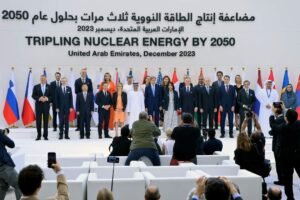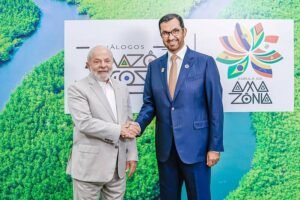COP28, the largest climate conference, concluded in Dubai on 12 Dec with global negotiators striving to address the urgent crisis of human-induced climate change. The conference touched upon some key issues such as the “phasing out of fossil fuels” and funding for vulnerable nations.
Here is a summary of the major concerns and outcomes of the Climate Talks in Dubai:
Key Concern of “Phasing-Out” in Global Stocktake
There was some apprehension regarding an oil executive leading the conference and the possible conflict of interest to which Sultan al Jaber issued a clarification stating, “You’re going to see full transparency and we will deliver what parties reach consensus on.”
The COP Presidency faced a crisis when comments made by Al Jaber previously about the science of phasing out fossil fuels, had been recirculated stirring controversy. In a live online event, he expressed skepticism, stating that there is no scientific basis or scenario supporting the achievement of a 1.5°C target through fossil fuel phase-out. This sparked strong criticism from the scientific and political communities. In response, during a rare press conference the following day, Al Jaber, alongside IPCC chair Prof Jim Skea, asserted the presidency’s commitment to science, emphasizing that all their work is grounded in scientific principles.
The following day, amid reports of negotiations being in “disarray,” the COP28 presidency presented another draft of the global stocktake text. However, this version was seen as less ambitious, leading to protests and critical responses from various parties, including the EU and small island states. Negotiations exceeded their scheduled end time of 11 am on December 12, causing further concern.

IAEA Imagebank, CC BY 2.0, via Wikimedia Commons
COP28 director-general, Ambassador Majid Al Suwaidi, acknowledged the dissatisfaction with the initial global stocktake draft, explaining that the intention was to provoke conversations. On December 13, an updated draft of the global stocktake text, including language about moving away from fossil fuels was released to delegates.
Global Goal on Adaptation
The framework outlines specific targets for countries, requiring them to engage in adaptation planning, implementation, and monitoring. By the year 2027, the expectation is that all nations will have operational early warning systems. Furthermore, by 2030, countries are expected to have formalized adaptation plans and demonstrated progress in their implementation.
Initiatives taken On helping countries deal with Climate change impacts:
Climate Finance
Similar to COP27, COP28 continued to focus on helping countries deal with the effects of climate change. The final agreement includes a call to double the money for adaptation efforts and outlines plans to assess and monitor adaptation needs in the future.
The final agreement calls for doubling adaptation finance, sets a 2030 date for targets on water security, ecosystem restoration, and health, but weakens language on closing the adaptation finance gap. Details on financing expectations were shifted to the implementation section, and more clarity is needed at COP29.
Loss and Damage Fund
COP28 achieved a landmark agreement on Loss and Damage, supporting nations facing severe climate impacts. The agreement covers national response plans, climate information, and promoting dignified human mobility due to loss and damage. A diverse board will manage the fund, initially overseen by the World Bank, with over $650 million pledged. Progress on the Climate Finance Target was made, building on the $100 billion pledge, but a post-2025 target is yet to be finalized, mirroring last year’s Loss and Damage negotiations.

Global Cooling Pledge
Under the COP28 Presidency, the Global Cooling Pledge is set to debut during COP28, spearheading a collective effort. This voluntary commitment is designed to boost ambition and enhance international cooperation by setting collective targets that prioritize improvements in energy efficiency and the adoption of climate-friendly strategies. Additionally, the pledge aims to increase accessibility to sustainable cooling, particularly for those who are most vulnerable.
Declaration to triple nuclear energy
This declaration signifies a commitment to triple the deployment of nuclear energy. It underscores the intention to significantly increase reliance on nuclear power as a strategic measure to address climate change and ensure a sustainable, clean energy future.
Global River cities alliance
The Global River Cities Alliance, led by the National Mission for Clean Ganga at COP28, includes countries such as India, Egypt, Netherlands, Denmark, Ghana, Australia, Bhutan, Cambodia, Japan, and river cities like The Hague, Adelaide, and Szolnok. Partnering with international funding agencies such as the World Bank, it expands the existing River Cities Alliance formed in 2021. Covering 275+ river-cities in 11 countries, GRCA is a pioneering global initiative for river conservation and sustainable water management. Launching GRCA at COP28 is a big move. After that, partner countries will work together on activities to make sure GRCA is put into action effectively.
Why did India accept UAE consensus?
The UAE successfully hosted the largest COP resulting in landmark agreements on loss and damage and transitioning away from fossil fuels. Despite achievements, the final accord seems incremental, insufficient for the urgent climate crisis during record heat.











Comments 1